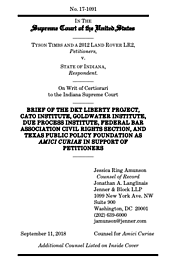Learn more about Cato’s Amicus Briefs Program.
“Individual freedom finds tangible expression in property rights,” and history shows that this freedom cannot be secured when the government has absolute power to impose fines and forfeitures. United States v. James Daniel Good Real Prop., 510 U.S. 43, 61 (1993); see also 3 Joseph Story, Commentaries on the Constitution of the United States 661 § 1784 (1833); Pet’r Br. 10–25 (recounting the abuse of fines by the English Crown and by state governments during Reconstruction). Respondent asks this Court to hold that state and local governments are entitled to this level of unrestricted power and that the Eighth Amendment’s prohibition on the imposition of excessive fines does not apply to them. Under the Court’s selective incorporation doctrine, Respondent is wrong for all of the reasons discussed in Petitioners’ brief. Amici write separately to emphasize the current need for basic limitations on state and local governments’ power to exact forfeitures and impose excessive fines and fees on individuals who come into contact with the criminal justice system.
Incentives matter, and state and local government officials are not immune from this basic principle of economics. In recent decades, state and local tax bases have decreased, while spending on criminal justice has increased. Faced with this economic reality, many state and local governments have turned to forfeitures, fines, and fees as a major source of revenue. This has led to excessive penalties like the one at issue here, where Petitioner Timbs’s vehicle was forfeited even though the forfeiture was grossly disproportionate to the maximumfine for his offense. More generally, the overzealous use of fines and forfeitures has distorted the criminal justice system in ways that threaten citizens’ rights to liberty, property, and due process. Amici herein highlight some of the abuses that could go unchecked if this Court were to hold that the Excessive Fines Clause of the Eighth Amendment does not apply to the states.
First, amici discuss the exponential growth in the use of civil forfeiture by state and local governments and the perverse incentives civil forfeiture creates for law enforcement. By giving those responsible for enforcing the law a large share—if not all—of the bounty from civil forfeiture proceedings, states are encouraging the abuse of power. Indeed, this is the very same dangerous incentive structure that inspired the adoption of Eighth Amendment’s Excessive Fines Clause and its predecessors in American and English law. Yet the lessons of the past have been lost in many jurisdictions, where the increased and egregious use of civil forfeiture is skewing law enforcement priorities and tilting the balance of power in plea bargaining even further in favor of the government.
Second, amici discuss the corresponding growth in the use of fines and fees by states and localities. As amici point out, the unrestricted use of fines and fees actually undermines the underlying goals of the criminal justice system. For incarcerated Americans, states often impose a flurry of additional fines on top of their sentences. This can prevent them from reintegrating into society by ensuring that their debt to society can never really be repaid. Further, for millions of Americans who struggle every day to lift themselves out of poverty, excessive fines can actually foster criminality. These citizens have no assets to spare and hardly any ability to absorb the costs of an excessive fine. They are also disproportionately likely to bear the brunt of a state or local government’s efforts to raise revenue through a scheme of fines. For these Americans especially, the unrestricted use of fines and fees poses a serious threat to their liberty.
These are precisely the types of social costs that the Eighth Amendment’s Excessive Fines Clause was designed to prevent. The Excessive Fines Clause limits the government’s power to collect fines “for improper ends.” Browning-Ferris Indus. of Vt., Inc. v. Kelco Disposal, Inc., 492 U.S. 257, 267 (1989). It does so mainly by prohibiting fines that are “grossly disproportional to the gravity of a defendant’s offense.” United States v. Bajakajian, 524 U.S. 321, 334 (1998). When used judiciously and proportionately, fines are an effective tool for deterring criminal behavior and punishing offenders. See Harmelin v. Michigan, 501 U.S. 957, 978 n.9 (1991) (opinion of Scalia, J.). But as Petitioners recount in their brief, our legal tradition has long understood that this power can be easily abused. Pet’r Br. 10–25. And the greatest risk of abuse comes when those who have the power to impose fines have a financial interest in the fines they collect. See Browing-Ferris, 492 U.S. at 268–73; Harmelin, 501 U.S. at 978 n.9. Applying the Excessive Fines Clause to the states will at least mitigate some of the more egregious uses of forfeitures, fines, and fees in the United States. For all of these reasons, this Court should reverse the judgment of the Indiana Supreme Court.

This work is licensed under a Creative Commons Attribution-NonCommercial-ShareAlike 4.0 International License.


